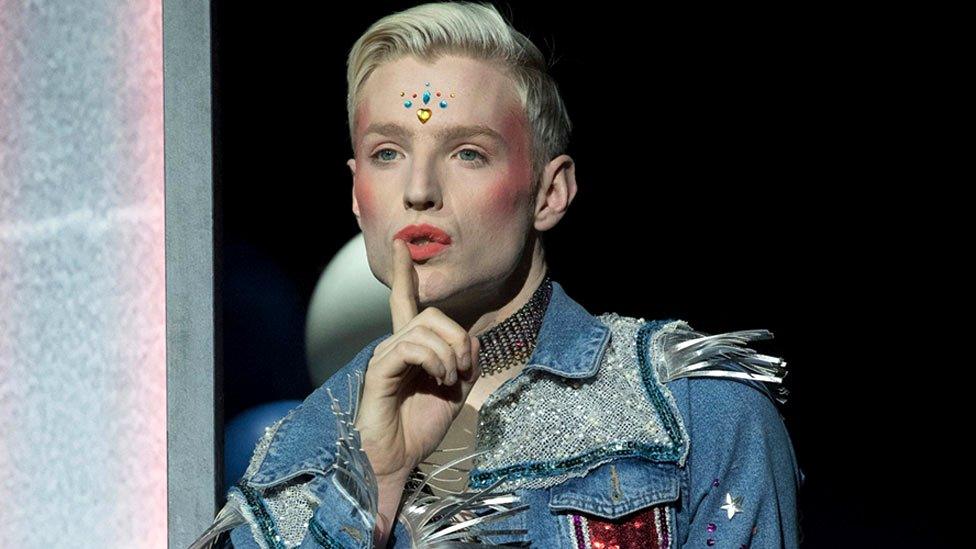Everybody's Talking About Jamie: 'There's more to the UK than London'
- Published
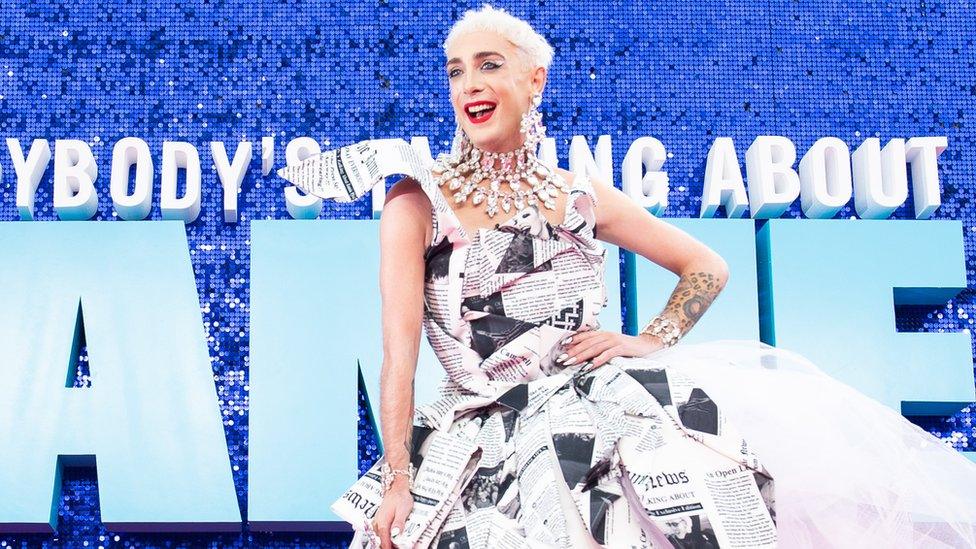
A BBC Three documentary about Jamie Campbell (pictured) led to a stage and film adaptation
The stage musical Everybody's Talking About Jamie had barely been open a week when a production company asked if they could turn it into a film.
The original show, inspired by a BBC documentary, told the true story of Jamie Campbell - a drag-obsessed boy desperate to wear a dress to his school prom.
The musical debuted with a short run at Sheffield's Crucible Theatre in 2017 before transferring to London's West End. But movie producers must have noticed its potential - a working class kid overcoming adversity and embracing his true self is the kind of tale that thrives in cinema.
"I knew we were going to be doing a film after 10 performances in Sheffield," recalls Jonathan Butterell, who directed both the show and the film. "Warp Films [the production company] came to the 10th performance, rang me the next day and said, 'We love this story, would you come in and chat to us about giving us the rights to make a movie of it?'"
For the real-life Jamie, the huge interest in his journey was a shock. "I didn't expect this kind of thing to come from going to prom in a dress," he says. "I still don't think it's that special. But the power it's given so many people, I'm just so thankful for it."
While a variety of actors have portrayed the titular role on stage, the movie sees newcomer Max Harwood play Jamie, a character who is openly gay at school and determined to break with convention.
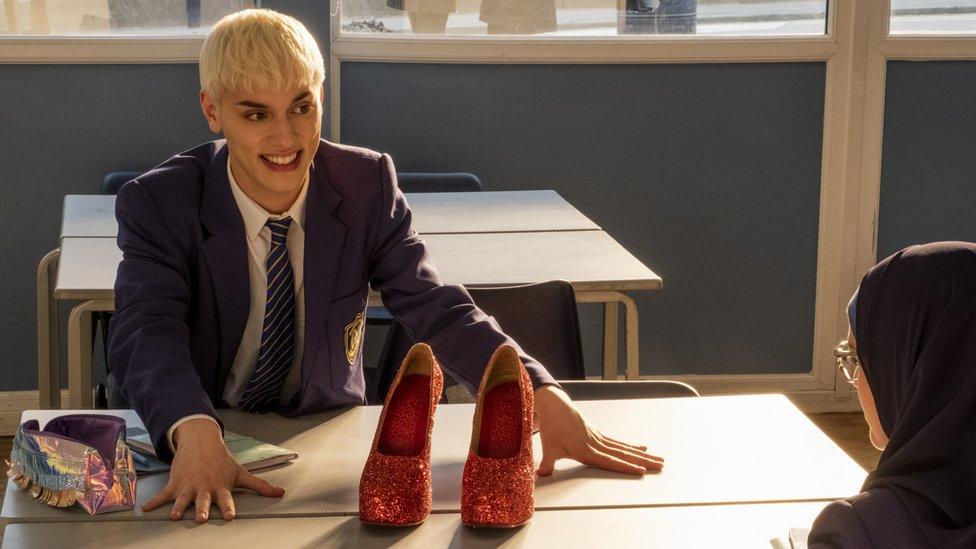
Newcomer Max Harwood plays Jamie in the new film adaptation of the stage musical
Although Jamie's mother is loving and fully supportive, he has bigger obstacles in the shape of his embarrassed father and disapproving teachers. Fairly standard ingredients for such a tale, but underneath the catchy songs and flamboyant dance routines, the story at its core had been under-represented in cinema.
"With all the emphasis on trans identities of late, cisgender drag performers (so central to queer culture) have taken a back seat at the movies," noted Variety's Peter Debruge., external "As RuPaul's Drag Race has demonstrated, fierce drag queens aren't hatched fully formed. They have to start somewhere, which makes this a relatively uncommon origin story."
The film adaptation stars Richard E Grant as Hugo Battersby, a shop owner who helps Jamie find his identity, Sarah Lancashire as Jamie's mum Margaret, and Lauren Patel as his best friend Pritti.
However, it's not unfair to say that Jamie isn't an altogether likeable character at times. As he develops his drag personality Fifi La True, his real-life self becomes more sassy - he talks back to his teachers and sometimes takes his frustrations out on those closest to him.
"Yeah, but the things that happen in the film, like when Jamie says to his mum, 'No wonder dad left you,' I would never say that," says Campbell, pointing out that both the film and stage show use some dramatic licence. "So that's always really hard to see."
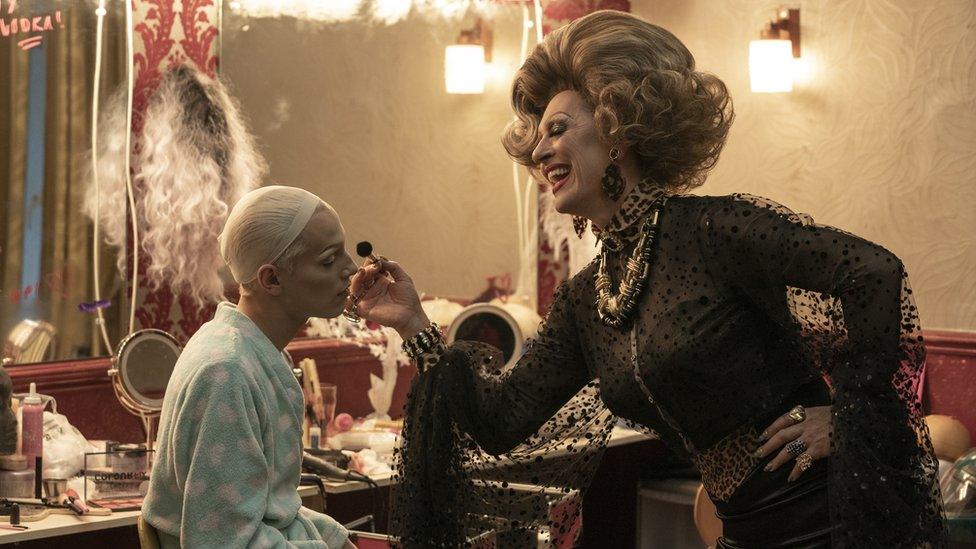
Max Harwood stars alongside Richard E Grant - who fully drags up for his on-screen character
Butterell explains: "We wanted to create what we call Jamie New. Because although we were inspired by Jamie Campbell, we wanted to allow our imaginations to make this story, and also give him the ability to step away from it, and say, 'This is inspired by me, but it's not all of me.'"
Some critics suggested the reason for the lead character's occasional arrogance and love of drag is he essentially isn't comfortable with his own appearance or personality.
"Even though he's excited to learn more about drag queens, what becomes apparent is that the young man is donning this new identity because he fundamentally dislikes who he is," said Screen Daily's Tim Grierson., external "Grappling with that crucial realisation ultimately becomes more important for Jamie than proving anything to the outside world."
We ask whether that is a fair assessment, while acknowledging that this question might be a bit deep for a Tuesday afternoon at a glitzy hotel press launch.
"That is a very deep question," Campbell smiles. "If we're being honest then, maybe, yes. I did drag because I needed that confidence. Fifi allowed me to do that. But as time went on I got lost in the character and forgot who I was as Jamie. And I only felt beautiful and confident when I was dressed as Fifi. But over the years I've come to learn that everything Fifi is, I am as Jamie and more.
"So that's why Fifi is on the back burner at the moment. But I mean, it's been a journey over the last 10 years. I had a lot of insecurities, problems coming to terms with things, and feeling like I'm not deserving of all this."
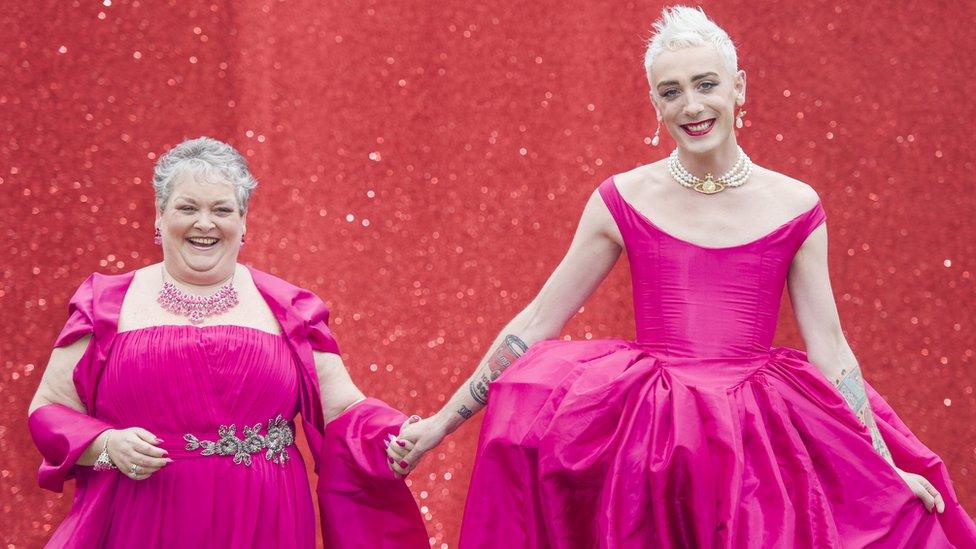
Campbell says he'd never speak to his mother Margaret (pictured) the way his character does on screen
Plenty would disagree. Campbell's story has connected with legions of young fans - particularly outside London - not least Harwood, who says he was a "huge fan" of the show before the film was announced.
"It was a crazy, seven-round audition process," he recalls of his casting. "I'd responded to an open call on the internet, my friend encouraged me to put myself forward and apply."
He did several readings before meeting Butterell and composer Dan Gillespie Sells. "I wasn't expecting to get the job," Harwood says. "When I did, I screamed, ran around, asked if I could tell my mum."
Harwood says he connected with Jamie's journey. "I'm from Basingstoke, a small town, and I grew up not having much queer representation. That's similar to how Jamie grew up in Durham."
For the stage, Butterell moved the setting from Durham to Sheffield, partly to put a bit of distance between the show and its real-life inspiration, but also because it was an area he was familiar with.
"I come from that particular community in Sheffield, I come from working class roots," says Butterell. "I felt I knew the world intimately, I knew those hills, that council estate, I knew inherently that what was at the centre of it was something real."
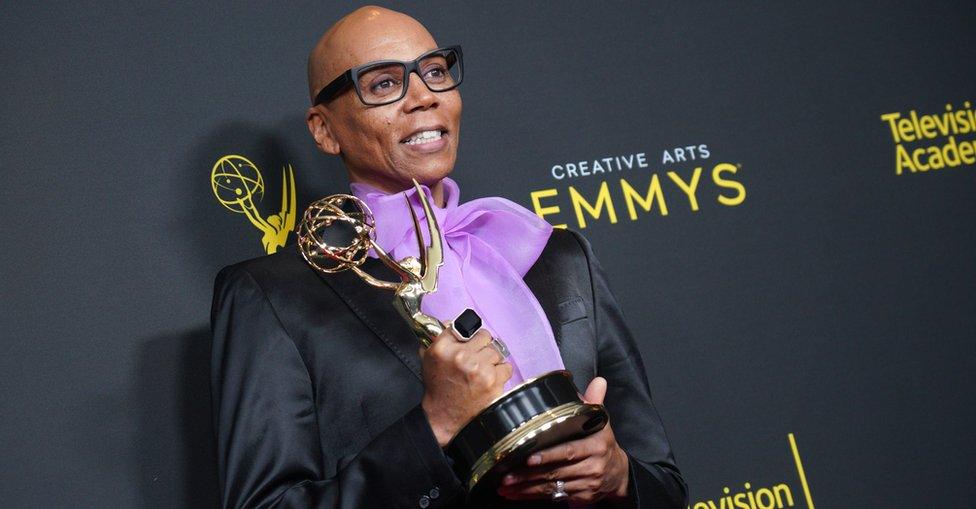
Campbell praises RuPaul (pictured) but says there's a lot more to drag culture than is represented in Drag Race
He continues: "There are a lot more stories all over the place that are ready to be told. Hopefully we're now at a time where more diverse voices are getting to tell their stories, and from within their own communities, and that's vital."
"There's more to this country than just London," adds Campbell. "London feels like its own country sometimes. But I think we definitely need to explore different areas of the country because there are more stories that need to be told from different places."
Ten years on from the events of the film, Campbell is busy with other projects - he recently launched a fashion label and is in discussion about some new TV shows and writing a book.
But considering his life story has been made into a West End hit and a major film, does he even need to work again? It's hard to imagine him being forced to keep working from a financial perspective.
"I'm not as rich as everyone thinks!" he replies. "My bank balance will confirm that at the moment. But I want to do creative projects, and I'm so lucky I'm able to do them, I don't think a nine-to-five would suit me, I got fired a few times back in the day."

Sarah Lancashire plays Jamie's mum (and even sings) in the film
The public's current interest in drag owes a great deal to a certain drag-based TV competition. But Campbell says: "People hold RuPaul's Drag Race as the standard and pinnacle, and of course I love the show as well, but it doesn't have to be that serious. You don't have to spend as much money.
"My favourite kind of drag is the rough-and-ready drag, the more creative turning-trash-into-treasure type thing. That's what drag is to me, that's what we would do back in the day. Just do whatever feels right, you don't have to hold yourself to any standards, especially RuPaul's. I'm not down-talking it, it is amazing, but there's more to drag than RuPaul's Drag Race."
Everybody's Talking About Jamie is available on Amazon Prime Video.
Related topics
- Published29 May 2018
